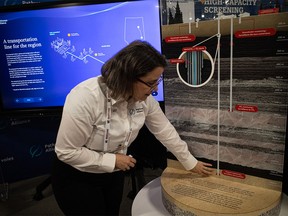
Canada’s natural resources minister is growing weary of waiting for the oilsands sector to start building one of the world’s largest carbon capture networks.
But feelings of frustration are also growing on the other side.
One of the country’s largest oilsands producers said Tuesday it’s still not seeing enough clarity around promised federal incentives for the Pathways Alliance group to start building its $16.5-billion carbon capture and storage network in northern Alberta.
The proposed development is a foundational part of the sector’s plan to attain net-zero emissions by 2050.
An executive with Cenovus Energy, one of the members of the alliance of oilsands producers, said that policy certainty is also being affected by a series of federal initiatives, such as the incoming emissions cap on the Canadian oil and gas sector.
“These massive projects take a lot of thought and they take a lot of time. That’s why I do get a bit frustrated when I hear some politicians and others publicly state that we should already have shovels in the ground for the Pathways CCS project,” said Cenovus Energy’s chief sustainability officer Rhona DelFrari.
“With what we know today . . . the government funding partnerships in Canada are not enough for large-scale CCS to proceed in the oilsands.”
The remarks were made at the company’s investor day in Toronto, less than a week after leaders with the Pathways Alliance met virtually with federal Natural Resources Minister Jonathan Wilkinson.
The back-and-forth volley between the Trudeau government and the sector is centred on the group’s massive carbon capture, utilization and storage (CCUS) project, and the level of federal incentives that are required to see it proceed.
The proposed development could eventually connect more than 20 oilsands facilities in Alberta through a CO2 pipeline to an underground storage hub near Cold Lake.
A final investment decision hasn’t been made, although planning work continues.
The Pathways Alliance includes Cenovus, Suncor Energy, Imperial Oil, MEG Energy, Canadian Natural Resources and ConocoPhillips Canada.
DelFrari noted significant engineering, environmental fieldwork and consultation with Indigenous communities have already been completed in preparation for “imminent regulatory applications.”
-
 Varcoe: Federal resources minister calls on oilsands producers to get moving on carbon capture project
Varcoe: Federal resources minister calls on oilsands producers to get moving on carbon capture project -
 World’s biggest carbon-capture project at risk, Wood Mackenzie warns
World’s biggest carbon-capture project at risk, Wood Mackenzie warns -
 Varcoe: Provincial report warns of $600B hit to Canadian economy from federal emissions cap
Varcoe: Provincial report warns of $600B hit to Canadian economy from federal emissions cap
However, there’s a “lack of clarity” around the draft regulations surrounding the federal investment tax credit for carbon capture projects — expected to cover up to 50 per cent of capital costs for equipment on such developments — that may prevent companies from accessing its full value, she said.
The companies also need to understand how promises of federal carbon contracts for difference will work. Such agreements are intended to provide long-term certainty to producers on the future national price of carbon, which is slated to head up to $170 a tonne by 2030.
DelFrari said Canada is adopting a complex “stick-based approach with some carrots thrown in,” unlike the United States, which has a straightforward incentive for CCUS initiatives based on each tonne of stored CO2.
“First of all, we can’t start construction of the CO2 pipeline or sequestration hub without regulatory approval, and that process, as I mentioned, is still underway,” she said.
“Without competitive fiscal incentives, our country risks being left out as large-scale emissions reduction investments are developed and deployed elsewhere where they get the best returns.
“We’re also dealing in Canada with significant policy uncertainty right now . . . The result is a lack of clarity that companies need to make long-term, multi-decade, multibillion-dollar decarbonization investment decisions.”
The blunt talk comes after Wilkinson publicly chastised the oilsands group in an interview last month with the Calgary Herald.
The natural resources minister called out the oilsands group, saying it needed “to start to show actual progress on the ground” and not merely run a public relations campaign about its proposed decarbonization plans.
On Tuesday, the natural resources minister’s press secretary said Wilkinson delivered the same message to the oilsands group last week, and the alliance members know the necessary details of the federal investment tax credit, which has not yet been formally passed.
“He is getting more frustrated as they continue to drag their heels, despite the federal government delivering on everything that is promised,” said Carolyn Svonkin.
“In order for talks to remain more productive, they need to do more of their homework.”
Discussions continue between the oilsands industry and the federal and Alberta governments. The provincial government has previously pledged to provide a 12 per cent grant on eligible capital costs for CCUS projects.
“We need the federal government to do its part and step up with supports for capital and operating costs,” Alberta Energy Minister Brian Jean said Tuesday in a statement.

With the oilpatch the largest emitting sector in the country, and the federal government needing to see progress from all sectors to reach its 2030 and 2050 climate targets, both sides will need to strike a deal in short order.
However, until they’re all are on board, expect the testy negotiations to continue, both in private and in public.
“These CCUS projects are absolutely massive undertakings, in terms of logistics and costs. They’re also absolutely going to be needed,” said Marla Orenstein, director of the Natural Resources Centre at the Canada West Foundation.
“While there has been a lot of goodwill on both these sides . . . when it comes down to the actual details of implementation, the cracks start to show.”
Chris Varcoe is a Calgary Herald columnist.
You can read more of the news on source



